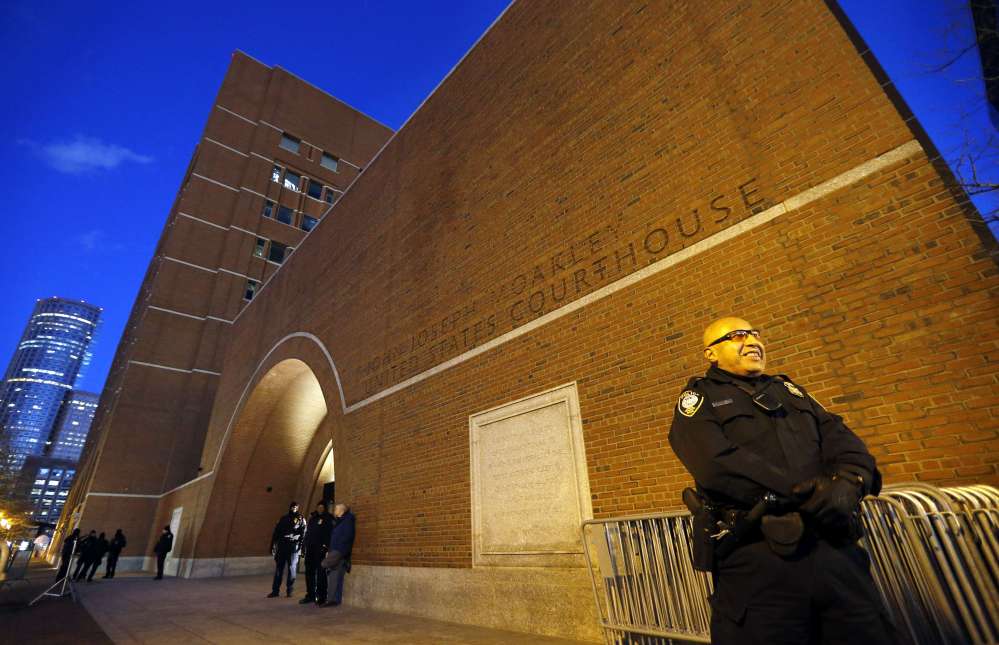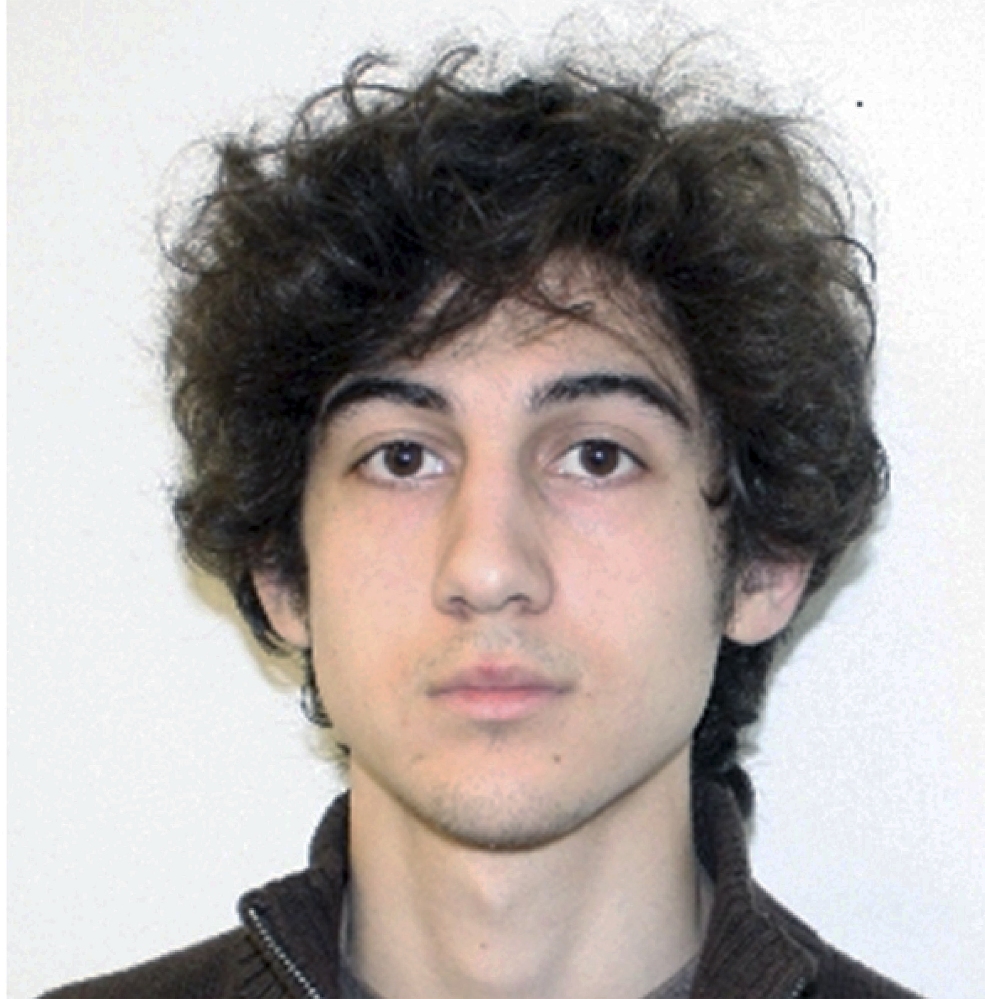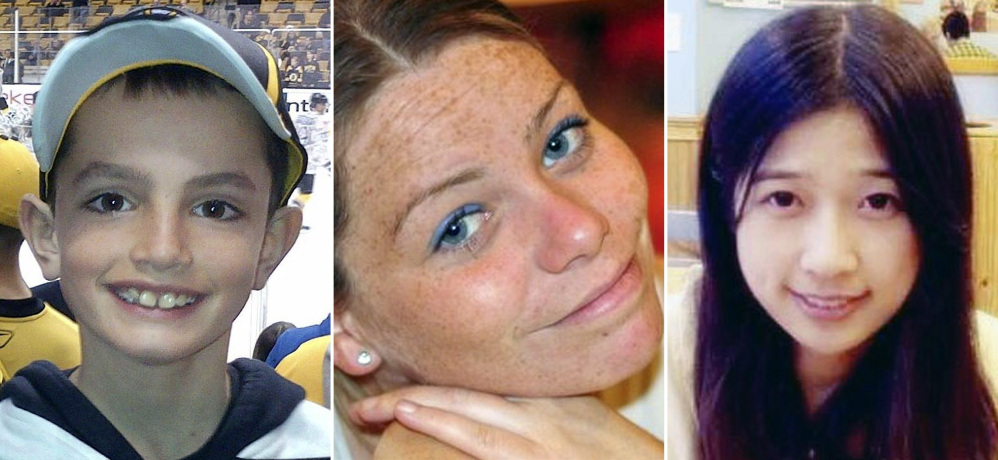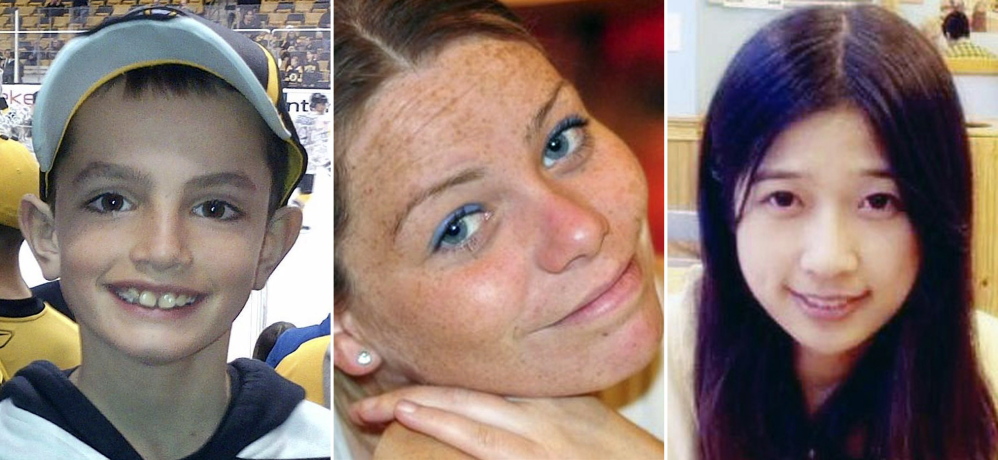BOSTON — As the trial of Boston Marathon bombing suspect Dzhokhar Tsarnaev begins, defense lawyers trying to keep their client off death row face a tough task: finding jurors who haven’t made up their minds about the man accused of setting off fatal explosions at the city’s premiere sporting event.
The defense team, which has worked on some of the highest- profile federal death-penalty cases, repeatedly failed to get the trial moved out of the city. Starting Monday morning, the lawyers began working with U.S. prosecutors to pick 12 jurors and six alternates from a pool of more than 1,200 Massachusetts residents for the capital murder case.
If the jury convicts Tsarnaev, it will have to decide whether the 21-year-old ex-college student should be executed. The government argues death is warranted by the horrific nature of the April 2013 attack, which killed three people, including an 8-year-old boy, and wounded 260, many of whose limbs were blown off in the street near the finish line.
The double bombing occurred in broad daylight during a televised race attended by thousands of spectators. It was followed by a five-day manhunt during which Tsarnaev and his brother allegedly shot and killed a police officer while citizens were told to take refuge in their homes.
The case’s notoriety will make jury selection more important than usual, since the questions used to ferret out bias will be scrutinized by any appeals court that hears a challenge to a conviction or sentence, said Mark Pearlstein, a former federal prosecutor in Boston.
“In most cases, even very high-profile cases, the extent to which jurors are aware of the details of a case is sometimes quite shockingly low,” said Pearlstein, who isn’t involved in the trial. “This case may well be the exception to that.”
Prosecutors claim Tsarnaev was inspired by al-Qaida and motivated by the killing of Muslim civilians in U.S. military actions.
Tsarnaev, a Russian of Chechen descent, received asylum in the United States when he was 8 years old and took the oath of citizenship seven months before the attack. His lawyers have complained that local news outlets have compared him to members of Islamic State, the Sunni Muslim group that’s carried out mass executions and beheadings in parts of Iraq and Syria.
They have signaled they’ll focus on saving their client from the death penalty by convincing jurors that most of the blame should be pinned on his older brother, Tamerlan Tsarnaev, who died in a shootout with police in the days after the attack.
The defense team is being led by Judy Clarke, who has represented some of the most infamous U.S. murder and terrorism defendants, including “Unabomber” Ted Kaczynski. She and her colleagues have argued that Tsarnaev can’t get a fair trial in Massachusetts because every potential juror was affected by the Boston attack.
“Every member of the jury pool is, in effect, an actual victim of the charged offenses,” Tsarnaev’s lawyers said in a Dec. 31 filing seeking a delay while an appeals court weighs in on the location of the trial. The motion was rejected Jan. 3.
The attack will be depicted “as having victimized not only those persons killed and injured, but also the marathon, marathon spectators and participants, the city of Boston, the communities through which the marathon passes, and the communities, such as Watertown and Cambridge, impacted during the search for the perpetrators,” the lawyers said.
Philip Anthony, chief executive of the trial consulting company DecisionQuest Inc., said the defense will look for jurors who don’t obsessively follow the news and don’t attend large sporting events or concerts. The lawyers will also try to weed out potential jurors who are nationalistic or patriotic, said Anthony, who isn’t involved in the case.
“The kind of person who is enormously patriotic and always puts America first is most likely going to want to lash out at this person as a terrorist,” Anthony said in a phone interview. “People who don’t harbor those views or look at the world through that lens are more likely to look at it simply as a criminal act.”
Pearlstein, the former prosecutor and now a partner at McDermott Will & Emery, said the defense will probably seek out “very liberal” jurors who have concerns about the death penalty. Massachusetts has no death penalty under state law, while the federal government allows capital punishment under U.S. statute.
Potential jurors who reveal a philosophical or moral opposition to the death penalty would be disqualified. A juror must be willing to consider all sentencing options, including death.
The first phase of jury selection will take place in six sessions over three days, with potential jurors, in groups of 200 to 250, filling out a questionnaire, court records show.
As the process started today, Tsarnaev appeared in court with his lawyers and stroked his beard as the judge instructed the potential jurors. The accused bomber didn’t enter the room wearing handcuffs or shackles on his feet as he did during previous hearings.
“We need your help and we need your honest performance of this important duty of citizenship,” O’Toole said.
Opening statements in the case may not begin until Jan. 26, the judge said today, indicating the jury selection process could span three weeks.
Clarke, Tsarnaev’s lawyer, has cited the prosecution of Timothy McVeigh as precedent for moving the case to another city.
The trial of McVeigh, a former member of the U.S. military who blew up the federal building in Oklahoma City in 1995, killing 168 people, was moved to Denver federal court to ensure less bias among jurors. He was convicted, sentenced to death and executed by lethal injection in the federal death chamber in Terre Haute, Indiana.
Like Oklahoma City, the Boston bombing “inflicted actual injury on the entire local population, especially children,” defense lawyers said in a filing last month.
If the U.S. Constitution doesn’t “require a change of venue in this case, it is difficult to conceive of any case that could ever warrant such relief in the future,” they said.
Boston U.S. Attorney Carmen Ortiz, who is leading the prosecution, has called the McVeigh example a “flawed comparison,” arguing the Oklahoma City bombing trial had to be moved because the courthouse was damaged.
Clarke and her team had also sought to delay the trial so they could prepare for possible testimony by a high school classmate of Tsarnaev. Stephen Silva reached a Dec. 19 plea deal on gun and heroin charges and agreed to cooperate in the bombing prosecution.
Government lawyers said in court papers Silva owned the gun used by Tamerlan to murder Sean Collier, a police officer for the Massachusetts Institute of Technology, in the days after the marathon bombing. Silva isn’t accused of involvement in the shooting or bombing.
The trial over the attack will probably transfix victims and citizens of Boston, even if it doesn’t offer much consolation, said Pearlstein.
“It’s hard to say whether or not this is going to achieve some form of catharsis for the city, but I guess it will be the most closely watched trial in Boston in 2015 and probably for many years thereafter,” he said.
Copy the Story LinkSend questions/comments to the editors.






Success. Please wait for the page to reload. If the page does not reload within 5 seconds, please refresh the page.
Enter your email and password to access comments.
Hi, to comment on stories you must . This profile is in addition to your subscription and website login.
Already have a commenting profile? .
Invalid username/password.
Please check your email to confirm and complete your registration.
Only subscribers are eligible to post comments. Please subscribe or login first for digital access. Here’s why.
Use the form below to reset your password. When you've submitted your account email, we will send an email with a reset code.